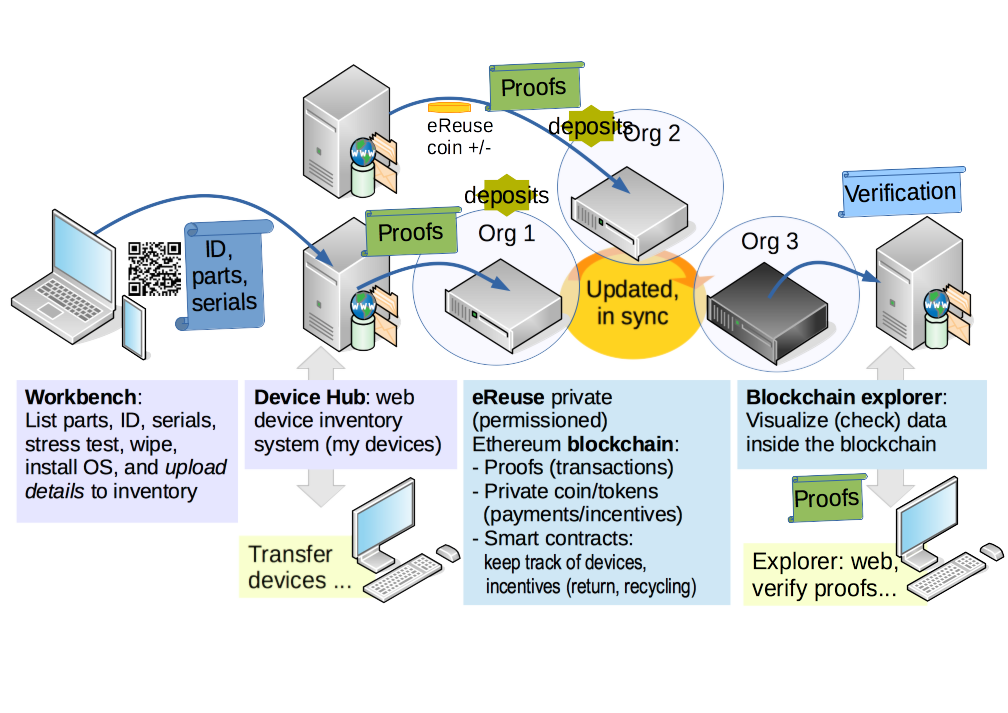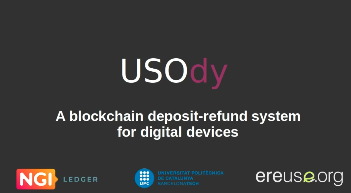We are in a “slow motion” environmental crisis, in comparison with the COVID crisis. There are many more electronic devices than people, and the numbers strongly vary depending on the source. ITU-T estimates 13 billion end-users ICT goods in 2015 and forecast 20 billion by 2030 (ITU-T_L.1470). The production of an ICT good has many times higher environmental impact than usage over their whole lifespan (Life-Cycle Assessment of Consumer Electronics). For that reason, the circular economy aims at eliminating waste and the continual use of resources, and represents an strategy to transform industrial processes to be more sustainable.
The mission of the eReuse community, shared with the USOdy initiative, is the transition to a collaborative and circular consumption of electronics. Some aims to achieve this:
- Reducing the cost of refurbishing and reusing by developing open-data and open-source tools and services, which can be used as well to compute circularity metrics.
- Promoting electronic refurbishing and reusing by exchanging and creating new business models around the circular economy.
- Ensuring reusing and recycling by providing traceability at component level.
We have been busy implementing a distributed ledger as a distributed source of truth for the traceability of computer devices. Every relevant operation on a device (ownership transfer, recycling, etc) is logged in our permissioned blockchain. Moreover, it is programmed to generate Proofs, that act as attestations about a past action or state of a device.
The use of the blockchain can provide, apart from a multi-stakeholder traceability system, a flexible approach to enforcing incentives throughout a device life-cycle. In the Ledger project, we have developed an incentive scheme according to which a form of a deposit is included in every device transfer between participants. This strategy, to promote the reuse and recycle of the devices with a “Deposit return system”, has been shown for other resources to be the most effective and sustainable way to make a zero waste circular economy happen as it maximises the lifespan of devices as useful resources.
However, that needs a careful data collection and processing policy:
- We have implemented it as a private (consortium) ledger where we store attestations about the data (hashes), not the data itself. Those that own and have the devices and its data can prove it from attestations (data) stored in the ledger, not the other way around.
- These attestations of the data rely on unidirectional functions that represent the two involved components: Devices and Actors (Humans or Entities)
- Device/component IDs are linked to external (protected) data about devices/components using hashes in URL/URNs.
- (Human) user identifiers (participants), we use Ethereum-like addresses. Although these addresses do not contain personal information, they are leak sensitive, in the sense that if the identity of its owner is disclosed, we could identify its participation in all transactions in the ledger, including the number of devices it has, that allows to guess its wealth or position in the market. Given that, participants use a pool of IDs, to the limit of a unique identifier for each transaction, therefore obfuscating the participants of the transaction, without damaging the auditability property of the blockchain.
This way, the ledger does not store any personal data, just proofs of it, and thus only meaningful for those that already have it. We use smart contracts to count and record results agreed to be made public (e.g. statistical data) to measure circularity, such as durability metrics for models and manufacturers, but individual details are not recorded.

